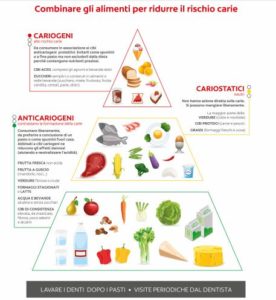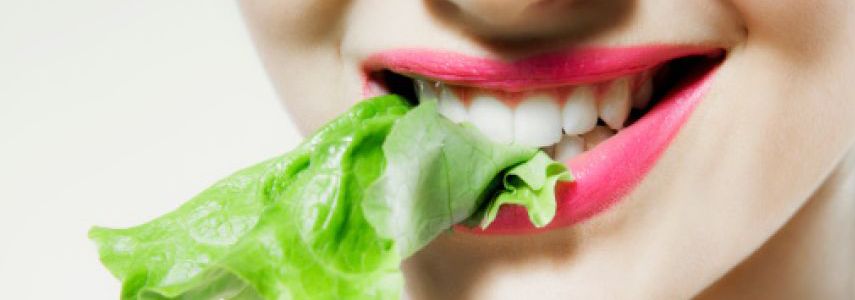Tooth health is our body’s litmus test. Nutrition and dental health are linked by a double thread: if on the one hand the food we ingest can affect the formation of caries and other types of pathologies, at the same time an incorrect chewing can affect the transformation of food into simple molecules to be assimilated with consequent repercussions on the health of our body.
Therefore, when we show the will to “keep the line”, “lose weight” or follow specific diets or diets (vegetarian, vegan, raw food) we must not forget that our food choices can have consequences, even serious, on our teeth.
A “do it yourself” vegan diet tends, for example, to decrease the assimilation of essential vitamins and minerals by forcing us to a low-calorie diet, this favors problems such as: bad breath, weakening of tooth enamel, discomfort in the gums.
Many diets instead encourage the intake of lemon or citrus juice in general, it is therefore advisable to know that acidic foods can be responsible for changes in salivary pH, which, if extreme and persistent, cause teeth and gums to get sick.
Citrus fruits, whole or squeezed, for example, despite being rich in vitamins, including vitamin C, contain citric acid, highly abrasive for dental enamel.
This does not imply avoiding them completely, on the contrary, their nutrients are so precious as to make them indispensable foods in daily nutrition. It is advisable to dose them properly and rinse your mouth immediately after ingesting them.
In high-protein diets, to be applied for short periods under the supervision of a specialist, the intake of a large amount of protein makes the blood more acidic with a consequent loss of calcium, an essential element for the health of the teeth.
An integration with foods or drinks with a high calcium content (e.g. milk or calcium water) would therefore be useful. In addition, it is important to maintain a 1: 1 or 1: 2 ratio between calcium and phosphorus, a precious mineral for calcium absorption. A diet that contemplates the excessive increase in phosphorus levels will ensure that the body uses calcium for teeth and bones to maintain balance.
For years there has been scientific evidence that underlines the cause-effect relationship between sugar intake and dental caries; for example, the raw food diet of the fruitarians is rich in simple sugars, which, if taken especially in the form of juices, they feed the bacteria of the oral cavity, responsible for bad mineralization of the teeth and therefore for the formation of caries.
It is essential to know the correct combinations of foods to buffer the acidity of the mouth and at the same time it is essential to ensure correct chewing and therefore digestion.
 A help is given by the dental-food pyramid promoted by the Italian Society of Orthodontics which suggests to us which foods are high, medium and low impact on the health of the teeth.
A help is given by the dental-food pyramid promoted by the Italian Society of Orthodontics which suggests to us which foods are high, medium and low impact on the health of the teeth.
When you decide to undertake any new lifestyle, both for ethical choices and to improve your psycho-physical well-being, you must always do it consciously, in order not to alter that precious balance of nutrients that are fundamental for the well-being of the whole organism and for the health of the teeth.
Article written with the contribution of Dr. Dominga Maio – biologist









